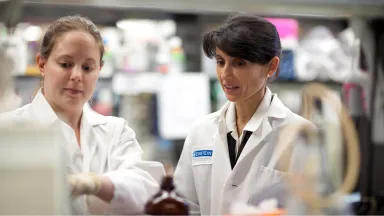
Bernice E. Morrow, Ph.D.
- Professor, Department of Genetics
- Professor, Department of Obstetrics & Gynecology and Women's Health
- Professor, Department of Pediatrics (Pediatric Cardiology)
- Sidney L. and Miriam K. Olson Chair in Cardiology
- Director, Division of Translational Genetics, Department of Genetics
- Faculty Advisor, Genomics Core, Department of Genetics
Area of research
- The main areas of research include human genetics and mammalian embryonic development. We are taking functional genomic and epigenomic approaches on a single cell level to understand the cause of birth defects.
Phone
Location
- Albert Einstein College of Medicine Michael F. Price Center 1301 Morris Park Avenue 402 Bronx, NY 10461
Research Profiles
Professional Interests
Our lab is interested in the mechanisms responsible for birth defects in humans. For this, we are investigating a genetic condition termed 22q11.2 deletion syndrome (22q11.2DS). Patients have a 3 million base pair deletion of one copy of chromosome 22q11.2. Most patients are affected with intellectual disability, congenital heart disease and other malformations, occurring at varied severity. To understand the reasons for varied severity, we are analyzing whole genome sequence from human subjects with 22q11.2DS to identify genetic modifiers. We recruited human subjects internationally and also through the new Montefiore-Einstein Regional Center for 22q11.2DS. Our hypothesis is that genes acting in the same genetic pathway as the deleted genes, act as modifiers of phenotypes. We are taking a candidate gene approach in which genes have been chosen from functional studies of mouse models of 22q11.2DS.
We are investigating the function of three genes, TBX1, DGCR8 and CRKL in mouse models. These genes are deleted in the 22q11.2 region. TBX1 encodes a T-box transcription factor, DGCR8 encodes a microRNA processor and CRKL encodes a cytoplasmic adaptor protein. Inactivation of either results in congenital heart defects in mice. We are taking functional genomic and epigenomic approaches on a single cell level to understand the connections to disease. For TBX1, we identified a progenitor cell population that is required for cell fate transitions in heart development. For DGCR8, we are investigating canonical and non-canonical microRNA functions. For CRKL, we are studying its role in neural crest cells in mediating cell signaling required for heart development. Finally, we are investigating TBX1, TBX2 and TBX3 in inner ear development in embryogenesis.
Selected Publications
Nomaru H, Liu Y, De Bono C, Righelli D, Cirino A, Wang W, Song H, Racedo SE, Dantas AG, Zhang L, Cai CL, Angelini C, Christiaen L, Kelly RG, Baldini A, Zheng D, Morrow BE. Single cell multi-omic analysis identifies a Tbx1-dependent multilineage primed population in murine cardiopharyngeal mesoderm. Nat Commun. 2021 Nov 17;12(1):6645. doi: 10.1038/s41467-021-26966-6. PMID: 34789765; PMCID: PMC8599455
Song H, Morrow BE. Tbx2 and Tbx3 regulate cell fate progression of the otic vesicle for inner ear development. Dev Biol. 2022 Dec 12;494:71-84. doi: 10.1016/j.ydbio.2022.12.003. Epub ahead of print. PMID: 36521641.
Yingjie Zhao, Yujue Wang, Lijie Shi, Donna M. McDonald-McGinn, T. Blaine Crowley, Daniel E. McGinn, Oanh T. Tran, Daniella Miller, Elaine Zackai, H. Richard Johnston, Eva W. C. Chow, Jacob A.S. Vorstman, Claudia Vingerhoets, Therese van Amelsvoort, Doron Gothelf, Ann Swillen, Jeroen Breckpot, Joris R. Vermeesch, Stephan Eliez, Maude Schneider, Marianne B.M. van den Bree, Michael J. Owen, Wendy R. Kates, Gabriela M. Repetto, Vandana Shashi, Kelly Schoch, Carrie E. Bearden, M. Cristina Digilio, Marta Unolt, Carolina Putotto, Bruno Marino, Maria Pontillo, Marco Armando, Stefano Vicari, Kathleen Angkustsiri, Linda Campbell, Tiffany Busa, Damian Heine-Suñer, Kieran C. Murphy, Declan Murphy, Sixto García-Miñaúr, Luis Fernández, International 22q11.2 Brain and Behavior Consortium, Elizabeth Goldmuntz, Raquel E. Gur, Beverly S. Emanuel, Deyou Zheng, Christian R. Marshall, Anne S. Bassett, Tao Wang, Bernice E. Morrow. Chromatin regulators in the TBX1 network confer risk for conotruncal heart defects in 22q11.2DS and sporadic congenital heart disease. NPJ Genome Medicine, In press.
De Bono C, Liu Y, Ferrena A, Valentine A, Zheng D, Morrow BE. Single-cell transcriptomics uncovers a non-autonomous Tbx1-dependent genetic program controlling cardiac neural crest cell development. Nat Commun. 2023 Mar 21;14(1):1551. doi: 10.1038/s41467-023-37015-9. PMID: 36941249; PMCID: PMC10027855.






